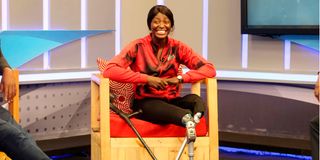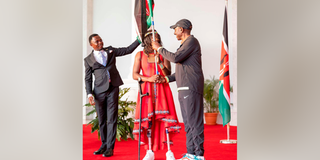Breaking News: Former Lugari MP Cyrus Jirongo dies in a road crash
Premium
Woman of Passion: From loss to legacy- The unstoppable Asiya Mohammed

The first Kenyan female rower to compete at the Paralympics Asiya Mohammed Sururu during NTV live sports show Sport0n hosted by Anchor Bernard Ndong and James Wokabi on March 11th 2024 at Nation Centre, NTV Studio.
What you need to know:
- At two years old a train passed over her lower body, severing my legs.
- Her father died from the shock of her accident. Her mother followed shortly after.
- Asiya’s bubbly personality made her a social butterfly at school.
- In 2018, Asiya was introduced to para-rowing. She has never looked back.
Asiya Mohammed could easily pass as the life of any party—chatty, bubbly, and humorous are just a few of the words that describe her. She doesn’t mind or care about the stares from strangers as she confidently moves on her “sexy robotic legs,” as she fondly calls her prosthetics.
“I’m used to the stares—I’ve had them for as long as I can remember. My friends even call me ‘cyborg,’” she says casually as we settle down for our interview.
Asiya is many things: Kenya’s first female para-rower to compete at the Paralympics, a professional teacher, and a multi-sport athlete in wheelchair tennis, badminton, and sitting volleyball. But her journey to these accolades began with a tragedy that reshaped her life.
A childhood forever changed
“I was born a normal child to doting parents of mixed religions—a Christian father and a Muslim mother. I even have a baptism name: Olivia,” Asiya shares cheekily. Born in Mombasa, she grew up in a close-knit, extended family.
Her life took a tragic turn at the age of two. “We lived near a railway line, next to the Kenya Power offices. I had a routine—crossing the tracks daily to eat at my grandmother’s eatery before returning to play with my cousins.”
On one fateful day in 1994, that routine ended in disaster. While running across the tracks to join her cousins, Asiya tripped and fell. She was unable to move as a fast-approaching train bore down.
“The train passed over my lower body, severing my legs,” she recounts. “In my panic, I used my left hand to lift myself, but I ended up losing three fingers.” Asiya passed out, and the scene descended into chaos.
Her father, witnessing the accident, collapsed in shock, while her mother, overwhelmed, gathered her severed limbs in confusion. An ambulance rushed Asiya and her father to Mombasa General Hospital, but her father succumbed to shock en route.
Asiya’s ordeal wasn’t over. She spent two years in the hospital, and during this time, she also lost her mother to elephantiasis.
Resilience amid adversity
After being discharged, Asiya returned to a loving family that helped her adapt. “My grandmother used to joke that even without legs, I couldn’t stay still. I was always up and about,” she recalls.
Her childhood friends eventually adjusted to her new reality, creating games she could participate in and carrying her around so she wouldn’t feel left out.
She attended Joytown Secondary School in Thika, where her perspective shifted. “At Joytown, I saw people with worse challenges than mine. That’s when I decided I had no excuse not to try.”
Asiya’s bubbly personality made her a social butterfly at school. “I loved socialising,” she says with a laugh. “I’d go from dorm to dorm, gathering people to play games.”
After finishing high school, Asiya pursued teaching at Shanzu Teachers Training College, graduating in 2015. As a teacher, she found acceptance and joy in her students’ playful nicknames, such as teacher wa crutches.

President Willliam hands over the Kenyan flag to Paralympic Athlete Asiya Mohamed at State House, Nairobi.
However, a sedentary lifestyle led to weight gain, prompting her to take up wheelchair tennis in 2017. “Joining the national team opened up a new world for me,” she says.
Discovering para-rowing
In 2018, Asiya was introduced to para-rowing. “I didn’t even know how to swim, but the idea of using my upper body strength intrigued me,” she says. Her first day on the water ended in capsizing, but she was undeterred.
“Rowing was hard, but it gave me peace. It’s therapeutic,” she says.
By 2019, Asiya was competing internationally, though it was far from easy. “At my first competition in Italy, I came last, but I didn’t care—I loved it. Failing gracefully is an art.”
That year, she became Kenya’s first female para-rower to qualify for the Paralympics. However, the journey to Tokyo was marred by challenges, including lack of support from the federation.
“My family had to raise money for my ticket to Tunisia for the qualifiers,” she says. “Without them, I wouldn’t have made it.”
Leaving a legacy
In Tokyo, Asiya gave her all. “I didn’t win, but my timing improved. For me, that was enough—I proved that Kenyan para-athletes belong on the world stage.”
Despite her achievements, she laments the systemic neglect of para-athletes. “We have to fight for every bit of support. It’s exhausting.”
Now 32, Asiya is stepping back from professional sports. “Sports started as a way to lose weight and make friends, but it became so much more. Now, I’m ready for something new.”
Her journey is a testament to resilience, courage, and an unyielding spirit.




